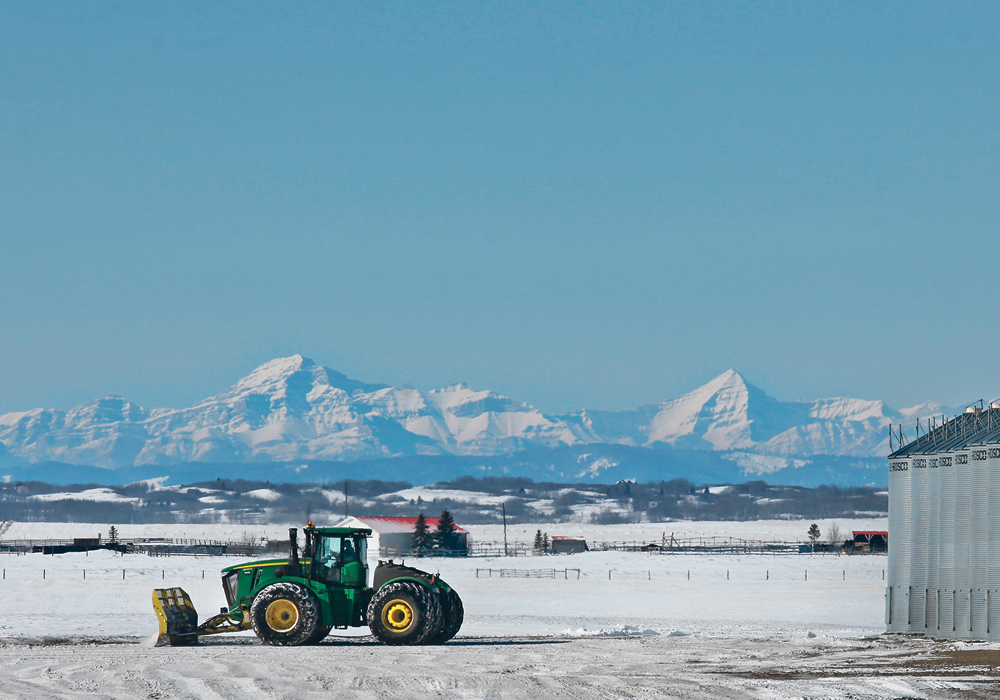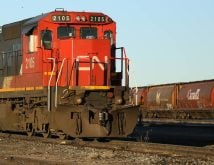Consistently frigid winter temperatures across the Canadian Prairies combined with heavy snowfall in the Rocky Mountains have significantly slowed grain movements and rail car deliveries over the past few weeks.
Conditions for railroading couldn’t be much worse, said Mark Hemmes, president of Edmonton-based Quorum Corp., during a Feb. 22 interview.
In addition to two “fairly major” derailments on the Canadian Pacific Railway network, heavy snowfall has slowed train movements through the mountains and has forced both railways to increase avalanche control efforts.
Reduced grain deliveries to the West Coast are contributing to higher vessel counts, a situation that often implies higher demurrage costs.
Read Also

Agritechnica Day 3: Hybrid drive for a combine, data standards keep up to tech change and tractors of the year
Agritechnica 2025 Day 3: Hybrid drive for a combine, data standards keep up to tech change and tractors of the year.
“It’s not been a good situation,” said Hemmes.
“Not only has it been extremely cold but they’re getting tonnes of snow in the mountains. That’s great for skiers but it sucks for railroading.”
Cold temperatures mean that railway crews are typically forced to shorten train lengths.
Shorter trains allow railroad crews to more easily maintain air pressure in rail car braking systems.
Train velocities have also been affected.
Hauling speeds are typically reduced in cold weather and trains are forced to stop more frequently to ensure safe operations.
Abnormally cold and snowy conditions at the Port of Vancouver in early to mid-February have also affected vessel-loading efforts.
A total of 20 vessels were waiting to be loaded at the Port of Vancouver as of mid-February.
That number is likely to increase over the next couple of weeks, said Wade Sobkowich, executive director of the Western Grain Elevators Association.
“I think that number is going to go up over the short term in Vancouver,” Sobkowich said.
“The next four to six weeks will be pretty critical.”
In its most recent report, the Grain Monitoring Program showed total west coast rail-car unloads (Vancouver and Prince Rupert) at less than 4,800 cars for the week ending Feb. 9.
That was down 23 percent from the previous four-week average.
Hemmes suggested rail-car unloads could remain at reduced levels “well into March.”
In the country, frigid temperatures have also slowed grain deliveries to country elevators, Sobkowich said.
A total of 623,000 tonnes of grain were delivered to country elevators in Week 28.
Deliveries were consistently over a million tonnes per week in mid- to late-January.
In its most recent weekly supply chain performance report, the Ag Transport Coalition suggested that Canada’s two largest railway companies supplied just 65 percent of the grain hopper cars requested in Week 28, down from 87 percent in Week 27.
Canadian National Railway supplied more than 3,000 rail cars, or 68 percent of demand, while CP delivered just over 2,000 rail cars, or about 60 percent of weekly demand.
Despite that, the railways have done a pretty good job of supplying cars in the 2018-19 crop year, Sobkowich added.
“Cold weather always has an impact on the grain supply chain, and this year is no different,” he said.
“We’re not getting the capacity that’s being demanded … but deliveries into the elevator system have slowed down too.”
















